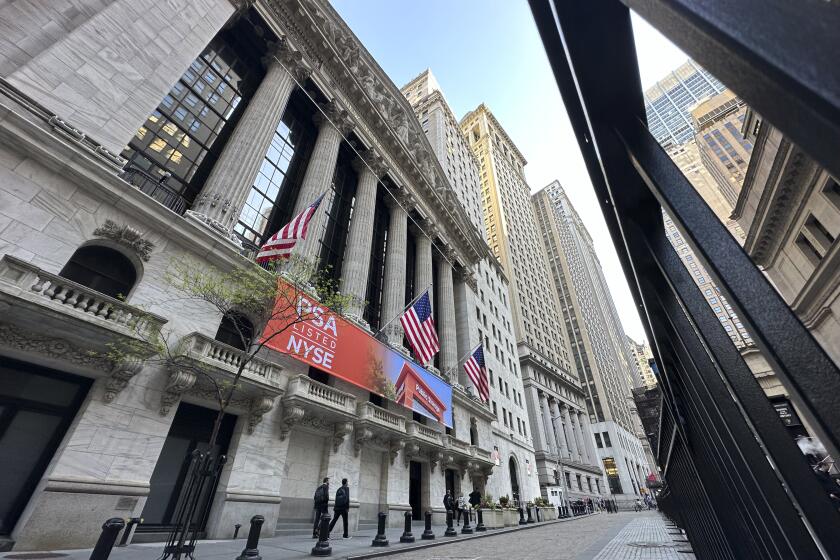Boating Industry Afloat Again After Being Sunk by Recession : Recreation: Luxury tax, since repealed, also helped swamp yacht sales, but smaller craft are hot sellers.
The swirling economic currents of the last several years have taken boat dealers like Larry Russo for a dizzying ride.
Russo saw his annual sales swell from $1 million to $10 million in the 1980s, then dip by more than 50% in the recession. Now he says business is picking up again, although people don’t buy luxury yachts like they used to.
“The high rollers are gone--well, not gone, but they’re just buying smaller boats,” said Russo, who runs a family boat business in Medford, Mass.
The boating industry as a whole is taking more modest turns this summer after being swamped by the recession and luxury taxes. Glitz is giving way to simpler, more practical designs. One of the hottest boat categories carries a typical price tag below $10,000.
That product, called the “jet boat,” is a variation of the jet ski that resembles a waterborne motorcycle, but instead is shaped like a boat to give passengers a dry ride.
Boston Whaler Inc., based in Rockland, Mass., introduced a jet boat line last year, and it quickly became the company’s best seller, helping overall sales rise by 18% last year.
“We’ve turned inward to see what to do to get out of bad economic times,” said Paula White, a spokeswoman for Boston Whaler.
The U.S. boating industry peaked in 1988, when approximately 749,000 recreational boats were sold. After that, the numbers started sinking with the economy, hitting bottom in 1991 with 439,000 boats sold. Last year, sales rose by 3%.
“We’re usually a leading indicator for recession and a lagging indicator for recovery,” said Jeff Napier, head of the National Marine Manufacturers Assn. “We’ve been in recession three or four years, and it’s been tough.”
Industry representatives say boat sales also were torpedoed by a luxury tax enacted in 1990 that imposed a 10% levy on boat purchases above $100,000. That tax, which also placed a levy on expensive jewelry automobiles over $30,000, was repealed recently in the Clinton tax package. In 1988, consumers bought more than 13,000 power cruisers averaging above this price threshold; last year, fewer than 3,600 were sold.
Outboard Marine Corp., which makes Evinrude and Johnson outboard engines as well as a broad line of boats, has seen its sales inch up slowly, rising 4% in the first three months of 1993 compared with the same quarter last year.
“We believe we have seen the bottom of this trough, but we are not seeing any fast return to the upside,” said Ronald C. Kuykendall, a spokesman for the Waukegan, Ill.-based company.
Kuykendall said boating purchases are closely linked to consumer confidence in the economy, and that doesn’t bode well for the industry since recent barometers of consumer confidence have fallen sharply.
“We are selling a product that is totally discretionary, that is very deferrable,” Kuykendall said. “Very few people are in a situation that they need a boat.”
To adapt to the changing lifestyles and tastes of the 1990s, boat manufacturers are taking humbler approaches. Sailboats, for example, are incorporating simpler rigging to make them easier to handle and more appealing to beginners.
Bayliner Marine Corp., a major power boat manufacturer, has rolled out new boat designs to reflect “more traditional family values,” said Jerry Stansfield, marketing communications director for the Arlington, Wash.-based company.
In the 1980s, the focus was on style as boats took on rounder, more sculpted looks, Stansfield said. Now, designers are devoting more attention to function and convenience, such as creating more head room.
Bayliner also has joined the new jet boat market, introducing a model last fall. It too has become a quick seller.
“You always try to identify new market opportunities,” Stansfield said, “more so when times are tough.”
At his dealership, Russo said he has sold more than two dozen jet boats since early last year. While all those boats together would be equivalent to selling one luxury yacht, Russo still appreciates any boost in business.
“It’s not robust. It’s not boom time,” he said. “But it feels good.”






